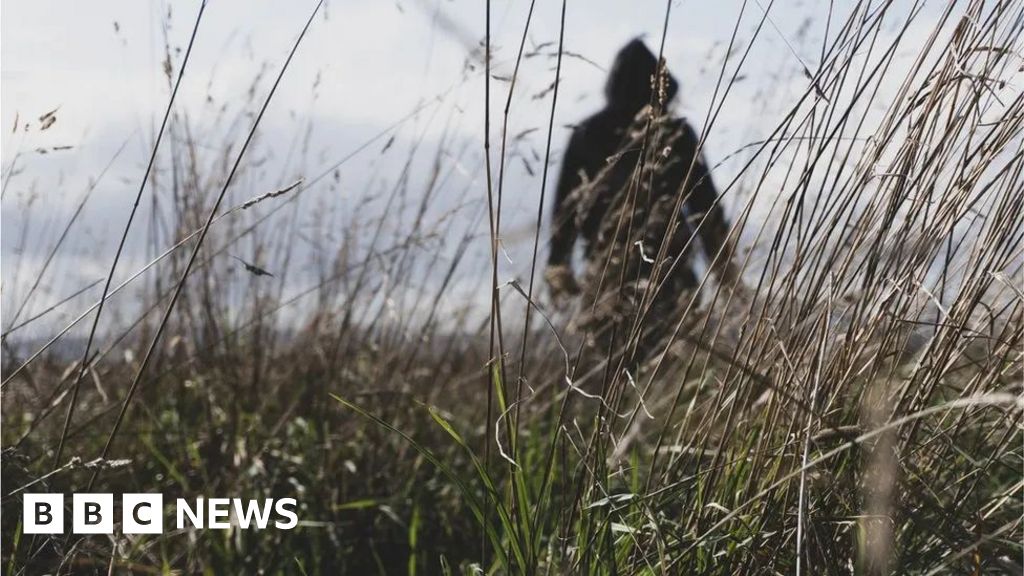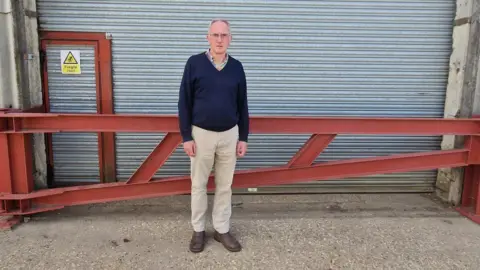 Simon Porter
Simon PorterFarmers and landowners say they are “at war” with countryside crime gangs and need more help from specialist rural police officers.
One farmer told the BBC he faced “constant warfare” against balaclava-clad thieves breaking into his farmyard and also against gangs of illegal hare-coursers.
A new report by the Country Land and Business Association (CLA) warns that police forces in England and Wales that cover large rural areas are “in crisis” and need more funding to fight back against the organised gangs.
The National Police Chiefs’ Council said forces were “strengthening their response” to rural crime.
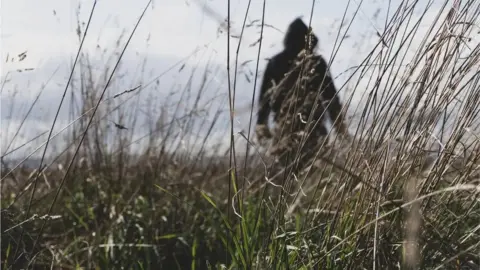 Getty Images
Getty ImagesThe CLA’s findings come after a Durham University report earlier this year .found there were 22 serious organised criminal gangs active in the countryside
Simon Porter, 65, who farms 570 hectares (1,408 acres) near the village of Crondall in Hampshire, has had to install £10,000 worth of farm defences, including three-tonne concrete blocks at entrances to his field, to keep the gangs out.
He has been targeted by thieves and violent gangs of harecoursers breaking onto his land for illegal racing and gambling.
Mr Porter told the BBC: “If we didn’t have all our defences, the countryside would simply become even more lawless and it would be an unsafe place in which to live because these people are hugely threatening.
“It is a war. I’m not trying to be dramatic. It literally is like that.”
‘Constant anxiety’
Mr Porter, who also runs a vineyard, said the gangs of thieves were targeting farms for quad bikes and expensive tools, often ramming the roller shutters on storage sheds to break in.
Local farmers, like many across the country, are now using mobile phone chat groups to warn each other of any suspicious activity, day or night.
“We have to leave our phones on 24 hours a day so it is just that constant anxiety,” said Mr Porter.
“You’ll get a call in the night so you have to get up, go out into the dark and walk around. That can be quite intimidating if you see a vehicle coming along at night.
“It is living on a bit of a cliff edge all the time for both us and our families.”
 CLA
CLAMr Porter said his local beat officers were “trying to do their best but with resources that are very limited”.
Inspector Cath MacDonald, of Hampshire Constabulary, told the BBC that officers “take rural crime very seriously, as the impacts on the livelihoods of those affected can be devastating”.
The constabulary is one of the 36 forces covering the countryside in England and Wales that were sent FOI inquiries by the CLA looking to produce a snapshot of how the police’s fight against rural crime is being resourced.
Hampshire has its own dedicated rural crime team with specialist equipment – specifically high-powered torches, surveillance drones, 4×4 vehicles, thermal spotters, microchip scanners and mobile ANPR cameras.
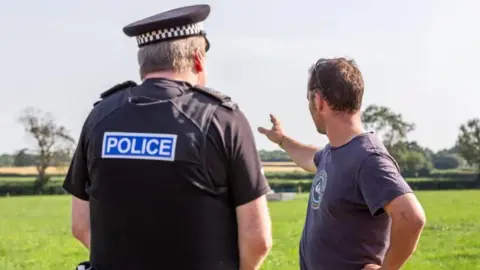 John Cottle/NFU
John Cottle/NFUBut the CLA found that, of the 20 police forces that provided information, five do not have a rural crime unit and no force had more than 0.7% of officers dedicated to tackling criminals operating in the countryside.
Durham Constabulary, which polices a predominantly rural area, is one of the forces that does not have a dedicated rural crime team.
A spokesman for the force said it instead relied on information supplied by locals as part of a new scheme monitored by a dedicated intelligence officer.
He said rural communities “are our eyes and ears and have proved time and time again that their assistance is making an impact and helping us drive down rural crime across our county”.
The FOI responses also revealed that Leicestershire Police has allocated just eight officers out of a total force of 2,252 to its rural crime team.
‘Smashing the gangs’
But Sergeant Rob Cross, from Leicestershire Police’s rural crime team, told the BBC that it was “one of most active rural crime teams in the country”.
Sgt Cross said that there had been a drop in rural and wildlife crime in the first six months of this year compared to the same period last year and that more than £1.5m worth of stolen farming equipment has been recovered.
Victoria Vyvyan, the CLA’s president, said that “the rural policing system is in crisis” with some farmers left feeling like they are in “a constant and expensive battle to keep criminal gangs at bay”.
“More people in the countryside are reaching the conclusion that they can’t always count on the police to keep their communities and property safe,” she added.
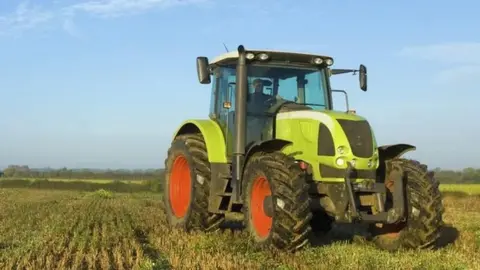 Getty
GettyA National Police Chiefs’ Council spokesman said all chief constables were working to ensure the police were “as visible and approachable as possible” in rural communities.
He said: “Police forces are strengthening their response to rural crime, with objectives set against a national rural affairs strategy.”
The latest annual national rural crime survey shows rural offences had risen by 22%, with a total estimated cost of £49.5m in insurance claims.
The National Rural Crime Network (NRCN) – an organisation made up of police and crime commissioners and organisations representing rural communities – has called for the future government to fund new specialist rural crime co-ordinators, rural crime training for all officers and control centre staff and greater use of new technology.
New strategy needed
A spokesperson said: “If we are serious about smashing these gangs then we must do more to tackle rural crime.”
The Conservatives said they had established the first ever dedicated rural crime unit within the National Crime Agency in 2023 and would continue to take action to protect rural communities.
Labour has said it will introduce a new cross-government rural crime strategy and would increase police patrols in rural areas.
The Liberal Democrats say they would scrap police and crime commissioners and invest the savings in ensuring every police force has a properly resourced rural crime team.
Plaid Cymru has pledged to set up a specialist rural crime team for the whole of Wales that would recruit officers from the farming community.
Note:- (Not all news on the site expresses the point of view of the site, but we transmit this news automatically and translate it through programmatic technology on the site and not from a human editor. The content is auto-generated from a syndicated feed.))
